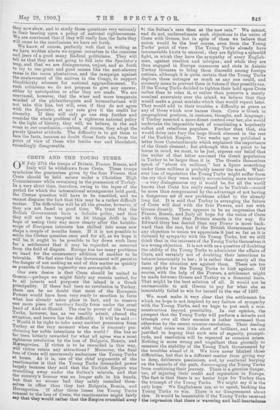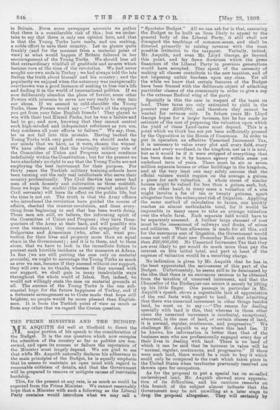CRETE AND THE YOUNG TURKS.
ON July 27th the troops of Britain, France, Russia, and Italy will be withdrawn from Crete. These troops symbolise the guarantees given by the four Powers that Crete should be held secure under a Christian High Commissioner while remaining in the possession of Turkey. Ina very short time, therefore, owing to the lapse of the period for which the international arrangement held good, the Cretan question will have to be resettled, and we cannot disguise the fact that this may be a rather difficult matter. The difficulties will be all the greater, however, if they are not faced in good time. We trust that the British Government have a definite policy, and that they will not be tempted to let things drift in the hope of seeing their way more clearly after the kaleido- scope of European interests has shifted into some new shape a couple of months hence. If it is not possible to settle the Cretan question once and for all, as we hope it will be, it ought to be possible to lay down such lines for a settlement that it may be regarded as removed froM the field of dispute. Europe has too many problems on hand for the unnecessary addition of another to be tolerable, We feel sure that the Government will perceive the danger of not making an end of this matter as quickly as possible if human ingenuity can accomplish it.
Our own desire is that Crete should be united to Greece,—perhaps we might fairly say remain united, for to all intents and purposes the island is a Greek principality. If there had been no revolution in Turkey, there can be no doubt that most of the European Powers would have been very ready to sanction in form what has already taken place in fact, and to remove one more piece of territory finally from under the cruel hand of Abd-ul-Hamid. The rise to power of the Young Turks, however, has, as we readily admit, altered the situation, and herein lies the difficulty. It will be said :- " Would it be right to take away another possession from Turkey at the very moment when she is sincerely pro- claiming her noble intentions to the world ? She has so far been bitterly rewarded for what all agree was a most righteous revolution by the loss of Bulgaria, Bosnia, and Hesiegovina. If virtue is to be rewarded in this way, will virtue retain any attractions ? Moreover, the final loss of Crete will enormously embarrass the Young Turks at home. As it is, one of, the chief arguments of the reactionaries is that the Young Turks demanded power largely because they said that the Turkish Empire was crumbling away under the Sultan's misrule, and that the country's 'honour was no longer safe in his hands, but that no sooner had they safely installed them- selves in office than they lost Bulgaria, Bosnia, and Herzegovina.. If after those losses the Young Turks consent to the loss of Crete, the reactionaries might fairly onY that they would zither that the Empire crumbled away at the Sultan's rate than at the new rate." We cannot, and do not, underestimate such objections to the union of Crete with Greece, but in spite of them we believe that union would be the best course, even from the Young Turks' point of view. The Young Turks already have innumerable knots to unravel; they are fighting a splendid fight, in which they have the sympathy of every English- man, against reaction and intrigue ; and while they are thus engaged in Europe massacres and riots in Asiatic Turkey threaten to bring them discredit among foreign nations, although it is quite certain that the Young Turks deplore these outrages as much as any one could, and sincerely mean to prevent them in future if they possibly can. If the Young Turks decided to tighten their hold upon Crete rather than to relax it, or rather than preserve a merely nominal suzerainty over the island, we believe that they would make a great mistake which they would repent later. They would add to their troubles a difficulty as grave as any of those which now harass them. Crete is Greek in geographical position, in customs, thought, and language ; if Turkey asserted a more direct control over her, she would undertake the impossible task of conciliating a hopelessly sullen and rebellious populace. Further' than that, she would drive into fury the large Greek element in the rest of the Turkish Empire. Two weeks ago we published a letter from Constantinople which explained the importance of the Greek element ; but although this is a point to be borne in mind, we must, to be just, express our belief that the writer of that letter assumed the Greek population in Turkey to be larger than it is. The Greeks themselves speak of "about six millions," but a figure something under three millions is probably nearer the mark. What- ever loss of reputation the Young Turks might suffer from the cry that they were weakly surrendering more territory —a very disingenuous cry it would be, for all the world knows that Crete has really ceased to be Turkish—would be more than compensated by the advantage of not having a dangerous set of new problems added to the already long list. It is said that Turkey in arranging the future of Crete will deal with the four Powers, and not with Greece directly. There appears to be an impression that France, Russia, and Italy all hope for the union of Crete with Greece, but that Britain stands in the way. Sir Edward Grey has denied than any Power is more back- ward than the rest, but if the British Government have any objection to union we appreciate it just so far as it is dictated by sympathy with the Young Turks, but we still think that in the interests of the Young Turks themselves it is a wrong objection. It is not with us a question of doubting the ability of the Young Turks to administer the affairs of Crete, and certainly not of doubting their intentions to behave honourably to her ; it is rather that nearly all the facts of the situation are against them. There are too many pricks for the Young Turks to kick against. Of course, with the help of the Powers, a settlement might be made between Greece and Turkey on a financial basis. That might be the best solution of all. It would not be unreasonable to ask Greece to pay for what she so lamentably failed to win for herself in the war of 1897.
We must make it very clear that the settlement fot which we hope is not inspired by any failure of sympathy with the Young Turks, and we hue to put such a mis- construction beyond possibility. In our opinion, the prospect that the Young Turks will perform a miracle and triumph over all their enemies is rather increased than otherwise by the recent counter-revolution. Their dealing with that crisis was little short of brilliant, and we are justified in hoping that such acts of sagacity, prompti- tude, and resolution will be repeated as occasion arises. Nothing is more wrong and ungallant than gloomily to measure the stability of the Young Turk Government by the troubles ahead of it. We have never blinked those difficulties, but that is a different matter from giving way to deep, deliberate pessimism, and, by continual harping on the hazards of the path, discouraging the Young Turks from continuing their Journey. There is a genuine danger, too, of injuring their credit and reputation in Europe. The fact is that there is no bettor hope for Turkey than the triumph of the Young Turks. We might say it is the only hope. We Englishmen are, so to speak, backing the Young Turks to win. There is no disagreement about this. It would be lamentable if the Young Turks received the impression that there is wavering and half-heartedness in Britain. From some newspaper accounts we gather that there is a considerable risk of this ; but we under- take to say that there is only one opinion hero, and that is that the Young Turks have made, and are making, a noble effort to save their country. Let us glance quite frankly (and for the moment from a material point of view) at what would happen if Britain faltered in her encouragement of the Young Turks. We should lose all that extraordinary windfall of gratitude and esteem which became ours at the time of the revolution. We had never sought our own ends in Turkey ; we had always told the late Sultan the truth about himself and his country ; and the popularity we enjoyed when the autocracy was unexpectedly overthrown was a good instance of seeking to lose one's life and finding it in the world of international politics. If we now deliberately abandon the place of favour, some other Powers with interests to serve are very ready to step into our shoes. If we boomed to cold-shoulder the Young Turks, these Powers would say :—" That's all the support you get from your false English friends ! They played to win with their tool Kiamil Pasha, but he was a failure and had to go ; and now, knowing that they cannot control such high-minded and independent reformers as you are, they condemn all your efforts to failure." We say, then, lot us not fall into this mistake. Having backed the Young Turks with very good reason, we should make up our minds that we have, as it were, chosen the winner. We have often said that the virtually military rule of the Committee of Union and Progress cannot continue indefinitely within the Constitution ; but for the present we have absolutely no right to say that the Young Turks are not employing the best instrument for their purpose. For thirty years the Turkish military training-schools have been turning out the only real intettectude who serve their country professionally. The Civil Service has never had men of such honesty and cultivation as these mektebli. Soon we hope the raulkio (the recently created school for Civil servants) will have its effect on the public life, but the time is not yet. The truth is that the Army officers who introduced the revolution have guided the course of affairs, checked the counter-revolution, and done every- thing from beginning to end that has been worth doing. These men are still, we believe, the informing spirit of the Committee of Union and Progress ; they have three- quarters of the Army at their back, and will possibly win over the remnant ; they command the sympathy of the Bulgarians and Armenians (who, after all, want pro- tection for their lives and property more than an equal share in the Government) ; and it is to them, and to them alone, that we have to look in the immediate future to prevent such horrible incidents as the massacre at Adana. In fine (we are still putting the case only on material grounds), we ought to encourage the Young Turks as much as ever we can, because if they succeed without our support, they will owe us no thanks, whereas if they succeed with our support, we shall gain in many incalculable ways throughout the whole world of Islam. But, indeed, we would not willingly state the case on material grounds at all. The success of the Young Turks is the one sub- stantial hope for the future happiness of Turkey, and if a fortunate arrangement as to Crete made that hope still brighter, no people would be more pleased than English- men. It is from the Turkish point of view as much as from any other that we regard the Cretan question.







































 Previous page
Previous page